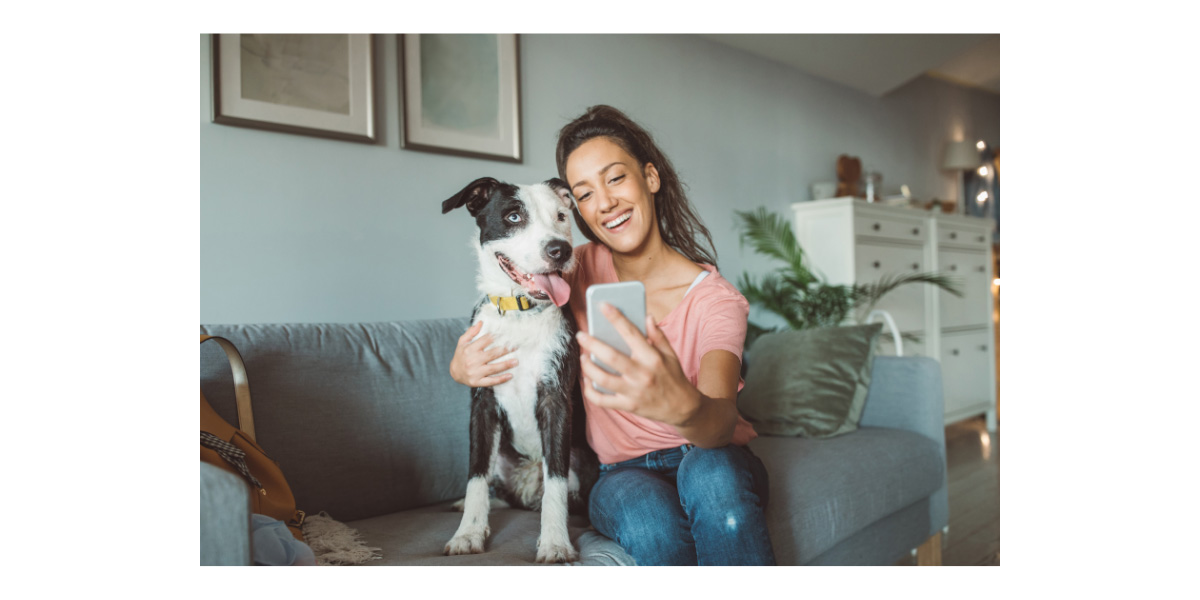
Do Dogs Like Hugs?
Sharing a snuggle with your dog is great for both you and your pup. Cuddling prompts the release of oxytocin, the feel-good "love" hormone, in both dogs and people.
By snuggling, you'll not only feel closer to your furry family member, but you can also enjoy real health benefits like anxiety relief, an immunity boost, better healing, and even better pain tolerance.
But snuggle therapy only works when you're showing your dog affection in a way that's comfortable for them. In recognition of National Hug Your Dog Day on April 10th, learn why some dogs don't like hugs, and how you can share affection in a way that your dog will love.
Why Some Dogs Don't Like Hugs
Dogs love to be close to their people, and most love physical affection. But hugging your dog with your arms wrapped around them can make them feel closed, threatened, and anxious. Hugs are not a natural display of affection for our canine companions, and anytime they're boxed in with no escape, it can trigger their fight or flight reflex.
Now, most dogs learn to tolerate hugs even if they don't like them. Even though they feel momentarily uncomfortable, many dogs can put up with a hug from their favorite human in a calm, familiar setting.
However, an ill-timed hug can lead to trigger stacking. Trigger stacking is when your dog experiences more than one source of stress at the same time, potentially leading to overstimulation.
A simple hug can become extremely stressful in situations like…
- Receiving a tight hug from a child, especially one they do not know or trust
- Being around strangers or in an unfamiliar public place
- Underlying pain from an illness or injury
- Repeated, unwanted physical attention
- When suddenly he woke up from a nap
- When feeling protective over a resource like a treat or toy
Why You Shouldn't Hug Your Dog
Unless you're sure your dog appreciates hugs, it's best to just avoid them. Dogs are living beings and it's important to respect their space. They cannot be trained to enjoy interactions that make them uncomfortable.
In the worst case scenario, an unwanted hug can lead to a bite. Even the sweetest, most well-behaved dog is capable of biting, especially when they're scared.
More than 4.5 million people are bitten by dogs each year in the United States alone, and around half of dog bite victims are children. Many bites affect the face and neck, and they occur when the person puts their face close to the dog to give them a hug or kiss.
By avoiding hugs, you'll have less of a chance of putting your dog in a situation that will make them feel as though they have to bite to escape. You'll also set a good example for children, who should learn to interact appropriately with dogs, both those of strangers and family dogs.
Signs Your Dog Might Not Like Hugs
If your dog enjoys hugs, they might come up to you and wriggle into your arms. When hugged, your dog may snuggle into you and sigh, and they might nudge you as though to "ask" for more when you stop hugging them
If you're unsure if your dog is enjoying a hug, look out for signs of stress:
- "Whale eye" - when your dog looks away so the white of their eye is visible
- Avoiding eye contact
- Licking their lips
- Tension in their facial expression, which may look like a furrowed brow and tightness around the mouth
- Yawning
- Flattened ears
- A hunched posture with a tucked tail
If you notice any of the above signs, give your dog some space. A dog that shows signs of stress, or even growls or snaps when hugged, is not a bad dog. These are signs that your dog is trying to communicate with you. Your dog should never be punished for warning signs like growling, as a dog that feels unable to communicate is more likely to escalate straight to a bite.
What To Do Instead of Hugging Your Dog
Even if your dog is not a fan of hugs, you can still show them plenty of affection on Hug Your Dog Day and year-round.
Dogs love a good scratch at the base of the ears, on their neck, chin, and chest, and over their back. Avoid patting your dog on top of the head, which can be uncomfortable for them. Instead, give your dog a few test scratches and then pause to see how they react. If they scootch into you for more, you’ve found a good scratching spot.
You can also snuggle and cuddle with your dog, so long as they have plenty of room to get away if they need space. Your dog might enjoy napping next to you on the couch, and may even stretch out and lay their head on your lap.
Some dogs are more likely to initiate affection than others. Lap dogs and notorious "velcro dog" breeds love to be touching their humans at all times, while others prefer to bond through walks, trick-training, and outdoor activities. No matter your dog's love language, learn to listen and you'll have a best friend for life.
VISION
Every pet deserves to live a long, happy, healthy life.












































